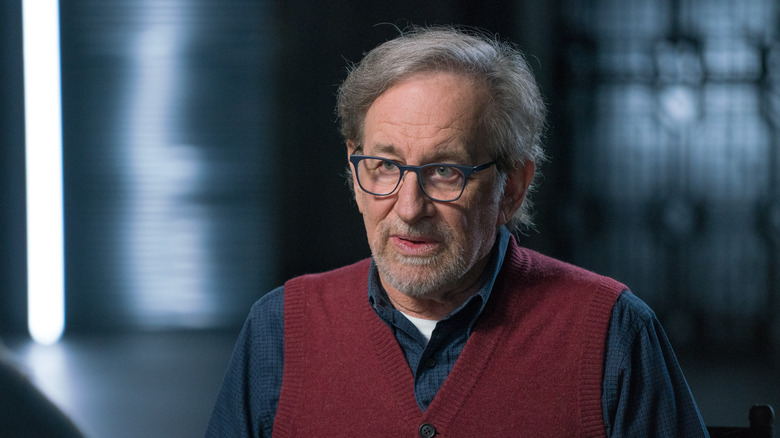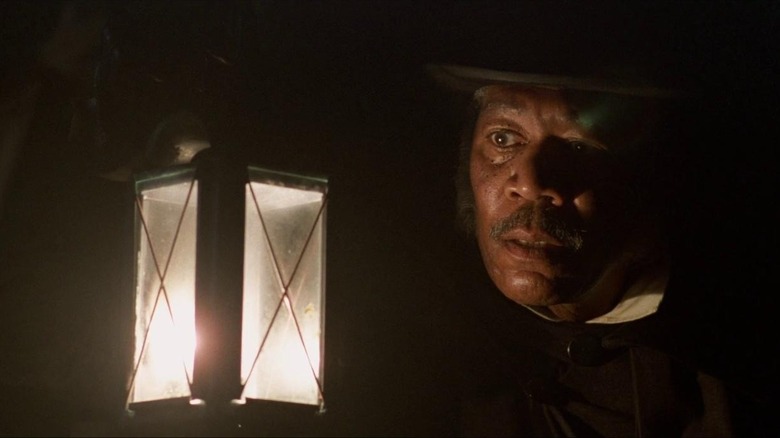The Steven Spielberg Movie That Left His Kids Too Bored To Finish
It's fairly common for directors to spend years in-between projects, and one would think that finishing Stanley Kubrick's vision for 2001's "A.I. Artificial Intelligence" would call for a much-needed vacation. But in 2002, Steven Spielberg was on a roll. In the same year, he released two distinct films featuring two different, massive A-list stars. In June, Tom Cruise played the leading man in Spielberg's sci-fi blockbuster, "Minority Report." And in December, Leonardo DiCaprio took on the role of Frank Abagnale, Jr. in "Catch Me If You Can," an ambitious semi-biographical drama where DiCaprio played opposite Tom Hanks. Both films were critical and financial successes, becoming the 10th and 11th highest-grossing films of 2002 respectively.
Perhaps most impressively, in 2001, Spielberg was able to accomplish production on these films while writing term papers to earn his Bachelor's Degree from Cal State Long Beach, something he committed himself to doing to honor his parents and set an example for his own children. Despite his accolades and his huge box office successes, Spielberg's children, as it turns out, would be his toughest critics.
In an interview with the late Roger Ebert in 2002, titled "Catching Up With Spielberg," Ebert praised his second theatrical viewing of "Minority Report," to which Spielberg answered:
"l haven't seen it again since it was released. I rarely look back at the movies I've made except when my kids see them for the first time. So I get a chance to see all my own movies again through my kids' eyes, which is always fun, you know, because they tell me whether they like 'em or not right away. Or they walk out. I've had my kids walk out of my pictures."
So, which Spielberg movie left his kids too bored to finish?
'They were bored by the legal stuff'
There are two kinds of Steven Spielberg films: The genre movies that put him on the map, and the political/historical pieces that Spielberg became passionate about even after his well-earned Academy Awards for "Schindler's List."
Though Spielberg's political/historical dramas are just as valuable to his artistic identity as the more celebrated genre films of his career, it isn't exactly a mystery which side of his filmography would better entertain young children, including his own. "They walked out of 'Amistad,'" Spielberg told Roger Ebert back in 2002. "I lost my whole family. All my young kids, you know. I wouldn't ever show them the middle passage and I didn't let them see the very beginning and they were bored by the legal stuff. They left."
Based on a true story of a 1839 Spanish slave ship, "Amistad" came out in 1997, the same year as "Jurassic Park: The Lost World." Though it received an initial warm critical response and boasts great performances from Morgan Freeman as Theodore Joadson and Anthony Hopkins as John Quincey Adams, with time it has been one of the more mixed historical drama efforts by Spielberg — often criticized for its white savior narrative. Especially since he skipped over some uncomfortable key scenes, leaving behind mostly the political interludes, it's hard to imagine what a kid would gain from that viewing experience.
Ironically, one of Spielberg's best traits as a director is how he approaches each of his films with a genuine sentimentality and child-like wonder that he hasn't lost touch with. His willingness to engage with his movies from the lens of his own children is not only sweet, but is fitting with his artist persona.

